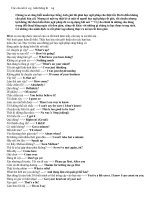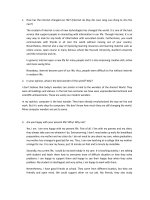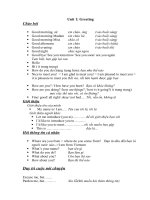Tieng Anh Giao Tiep bai 9
Bạn đang xem bản rút gọn của tài liệu. Xem và tải ngay bản đầy đủ của tài liệu tại đây (128.46 KB, 4 trang )
<span class='text_page_counter'>(1)</span>LESSON 1 TOPIC: I CAN DESCRIBE THE UNIVERSE A. SPEAKING I. INTRODUCTION:. Jupiter. Venus. Universe: vũ trụ. Sun. (1). (2). Look at the pictures and what is it?.
<span class='text_page_counter'>(2)</span> moon: mặt trăng satellite: vệ tinh earth; trái đất sun: mặt trời star: vì sao planet: hành tinh solar system: hệ thái dương rocket: tên lửa venus: sao kim mars: sao hỏa jupiter: sao mộc neptune: sao hải vương P 1: Solar system: - Do you know positions of these planets in the solar system? - Which planet lies near the earth? - Do you know the velocity of the sunlight transmitted from the sun to earth? - Do you know the shape of earth? - Does the earth standstill or move? - Do you know the cycle of revolving of some planet? P2: Rocket Who invented rocket? And when and where was it invented? How many kinds of rockets are there? Rockets can be classified into the followings: 1. Air-to- air rocket 2. Air –to – earth rocket 3. Air- to – submarine rocket 4. Air –to – earth rocket 5. Air- to – submarine rocket 6. Submarine-to-submarine rocket Vocabulary: circle = revolve /ri'zɔlv/: quây quanh space /'speis/: không gian gain /gein/ sth: scientist /'saiəntist/: nhà khoa học analyse: /'ænəlaiz/; phân tích experiment /iks'periment/: sự thí nghiệm confirm sth: xác nhận cái gì invent /in'vent/: phát minh exist /ig'zist/: tồn tại, hiện có. II. DISCUSSION: What countries are powerful in investigating the universe?.
<span class='text_page_counter'>(3)</span> Some achievements in this field have human beings got Can tell some firms or organizations specializing in this field? Do you want to work in this field ? Some special characteristics or other standards of an astronaut.. B. LANGUAGE REVIEW Many adverbs are made from an adjective + -ly: Adjective: heavy Abverb: heavily. Quick. serious. careful. quiet. Quickly. seriously. carefully. quietly. Adjective: happy Abverb: happily. Fluent. special. continuos. frequent. Fluently. specially. continuosly. frequently. Adjective: successful Abverb: completely. nervous. perfect. bad. complete. nervously successfully. perfectly. badly. Examples: The driver of the car was seriously injured in the accident. Our holiday was too short. The time went very quickly. Not all words ending in –ly are adverbs. Some adjectives end in –ly,for example: Lovely lonely lively silly friendly elderly.
<span class='text_page_counter'>(4)</span> I.. Compare the adverbs and the adjectives in the sentence below: Adjective + noun Linking verb + adjective (especially be) Tom is a careful driver. We didn’t go out because the heavy rain. Please be quiet. I as disappointed that the exam result was so bad. Why do you look so serious? She speaks perfect Englih. Adjective+noun Compare: Tom looked sad when I saw him.. II.. Ordinary verb + adverb Be + adverb + adjective Tom drove carefully a long the road. We didn’ go out because it was raining heavily. Please speak quietly. I was disappointed that I did so badly in the exam. Why do you take me seriously? She speaks English perfectly. Verb+object+adverb Tom looked at me sadly.. We also use adverbs before adjectives and other adverbs. For example: Resonably cheap (adverb + adjective) Terribly sorry (adverb + adjective)(very) Incredibly quickly (adverb + adverb) Examples: It’s a reasonably cheap restaurant and the food is extremely good. Tom learns language incredibly quickly. The examination was surprisingly easy. I’m terribly sorry. I didn’t mean to push you. We can also use an adverb before a past participle (injured, organised, written…) Two people were seriously injured in the accident. The meeting was very badly organised. Note:-Incredibly: unbelievably.
<span class='text_page_counter'>(5)</span>









